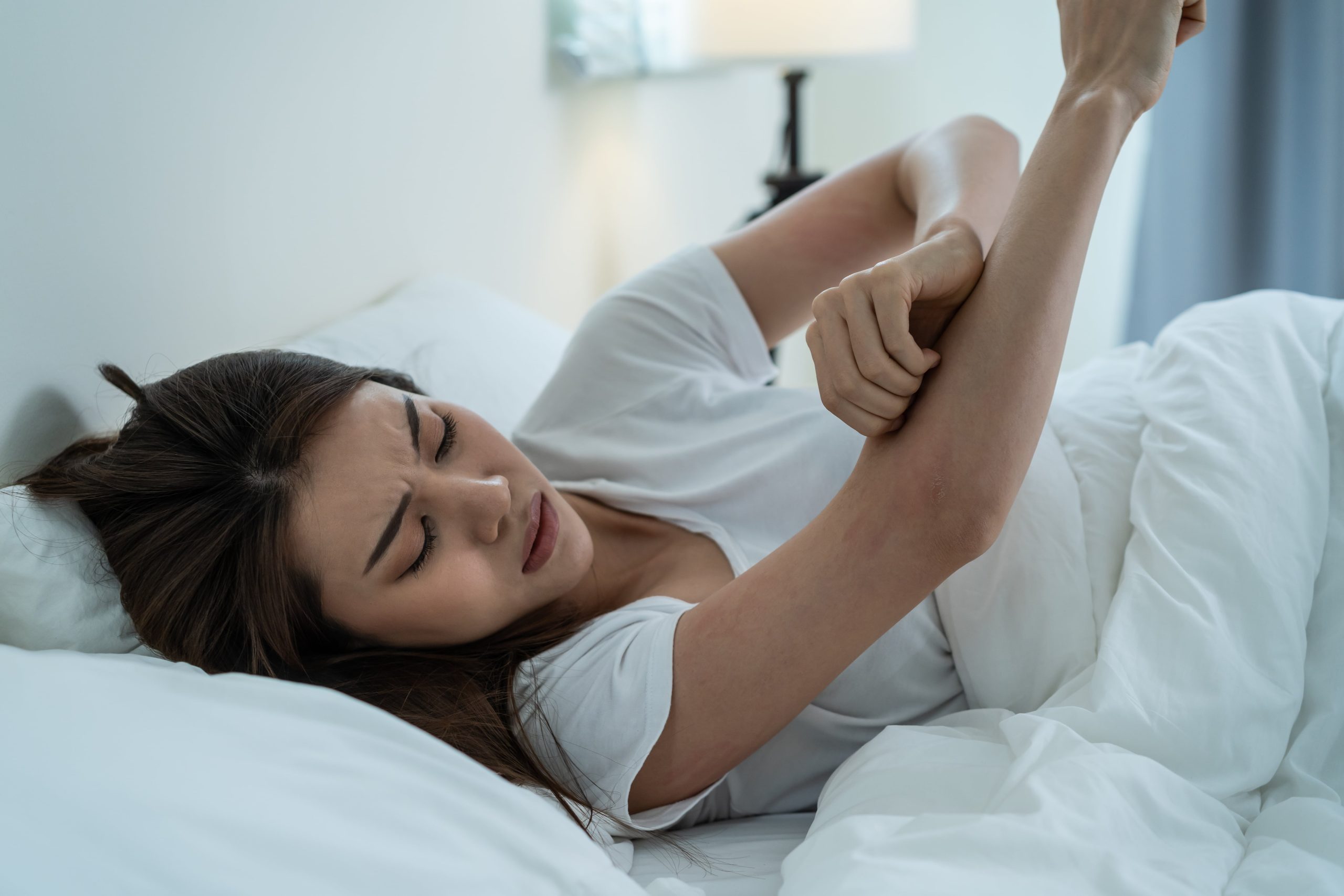
A doctor’s advice on common skin problems in Singapore: eczema, heat rash and acne

FEBRUARY 23, 2022
Singapore’s sunny climate can be a source of bliss, but the heat and humidity can be a real source of irritation. If you’ve noticed an undesirable change in your skin (from dryness to sensitivity, pimple breakouts, rashes or eczema, you aren’t alone – and with the right advice you can make a real change to feel comfortable in your own skin. Here are some tips on identifying the causes of common skin conditions and the changes you can make to help manage them.
THE PROBLEM: SWEAT RASH (HEAT RASH OR PRICKLY HEAT)
This condition, known medically as miliaria, occurs when sweat ducts are blocked. Sweat produced cannot escape and evaporate from the skin surface, resulting in red bumps that are irritable or itchy. It is typically seen in up to 30% of people living in hot and humid conditions and is more commonly seen in babies than adults. Aggravating factors include wearing synthetic, non-breathable clothes, and excessive sweating during outdoor activities.
The solution:
Wear cotton and breathable clothing, take a shower and cleanse the skin soon after excessive sweating. Keep your baby in cooler environments, and take care not to overdress or cover your baby excessively when outdoors, especially when they are sleeping in the pram.
THE PROBLEM: PIMPLES AND ACNE
People prone to acne may find that their skin flares up in hot and humid climates. This is due to the excessive sweat that can trap dust and grime within skin pores, causing them to clog up. The heat can also contribute to more sebum production, causing skin to be more oily and clogging the skin pores further. These changes together with the skin bacteria (propionibacterium acnes) are the perfect recipe for an acne flare-up!
The solution:
Take a shower and cleanse the skin soon after excessive sweating, use medicated and anti-bacterial wash and gels to clear the bacteria off the skin and reduce sebum production. Check the labels and opt for non-comedogenic (non-pore blocking) sun creams and make-up.
THE PROBLEM: ECZEMA
Although eczema is often exacerbated by cold and dry conditions, the humid and hot climate may not be so welcoming. Excessive sweating, particularly in the skin folds where eczema is most prevalent, can irritate the skin and exacerbate eczema. Keep in mind that spending time in chlorinated pools and using irritating sun creams can cause eczema to flare up. If eczema is aggravated by allergies, then exposure to new allergens in the environment may be contributing.
The solution:
Take a shower and cleanse the skin soon after excessive sweating. Use a light moisturiser to treat eczema when outdoors and reserve the thicker moisturisers for nighttime use. Watch out for exposure to skin irritants and consider allergy testing if you suspect this may be a contributing factor. Our Doctor’s personal advice? Enjoy the Singapore climate, but if your skin is suffering then remember to wash soon after activities that result in excessive sweating. Try to minimise the sweat factor and keep cool. Hydrate regularly and visit your doctor if simple measures aren’t effective.
Singapore’s sunny climate can be a source of bliss, but the heat and humidity can be a real source of irritation. If you’ve noticed an undesirable change in your skin (from dryness to sensitivity, pimple breakouts, rashes or eczema, you aren’t alone – and with the right advice you can make a real change to feel comfortable in your own skin. Here are some tips on identifying the causes of common skin conditions and the changes you can make to help manage them.
THE PROBLEM: SWEAT RASH (HEAT RASH OR PRICKLY HEAT)
This condition, known medically as miliaria, occurs when sweat ducts are blocked. Sweat produced cannot escape and evaporate from the skin surface, resulting in red bumps that are irritable or itchy. It is typically seen in up to 30% of people living in hot and humid conditions and is more commonly seen in babies than adults. Aggravating factors include wearing synthetic, non-breathable clothes, and excessive sweating during outdoor activities.
The solution:
Wear cotton and breathable clothing, take a shower and cleanse the skin soon after excessive sweating. Keep your baby in cooler environments, and take care not to overdress or cover your baby excessively when outdoors, especially when they are sleeping in the pram.
THE PROBLEM: PIMPLES AND ACNE
People prone to acne may find that their skin flares up in hot and humid climates. This is due to the excessive sweat that can trap dust and grime within skin pores, causing them to clog up. The heat can also contribute to more sebum production, causing skin to be more oily and clogging the skin pores further. These changes together with the skin bacteria (propionibacterium acnes) are the perfect recipe for an acne flare-up!
The solution:
Take a shower and cleanse the skin soon after excessive sweating, use medicated and anti-bacterial wash and gels to clear the bacteria off the skin and reduce sebum production. Check the labels and opt for non-comedogenic (non-pore blocking) sun creams and make-up.
THE PROBLEM: ECZEMA
Although eczema is often exacerbated by cold and dry conditions, the humid and hot climate may not be so welcoming. Excessive sweating, particularly in the skin folds where eczema is most prevalent, can irritate the skin and exacerbate eczema. Keep in mind that spending time in chlorinated pools and using irritating sun creams can cause eczema to flare up. If eczema is aggravated by allergies, then exposure to new allergens in the environment may be contributing.
The solution:
Take a shower and cleanse the skin soon after excessive sweating. Use a light moisturiser to treat eczema when outdoors and reserve the thicker moisturisers for nighttime use. Watch out for exposure to skin irritants and consider allergy testing if you suspect this may be a contributing factor. Our Doctor’s personal advice? Enjoy the Singapore climate, but if your skin is suffering then remember to wash soon after activities that result in excessive sweating. Try to minimise the sweat factor and keep cool. Hydrate regularly and visit your doctor if simple measures aren’t effective.
Recent Post
-
Dementia Screening Singapore – MRI Brain Imaging
May 16, 2024 -
At What Age Does Breast Screening Start?
January 31, 2024 -
Why Is Corporate Health Screening Important?
January 30, 2024



